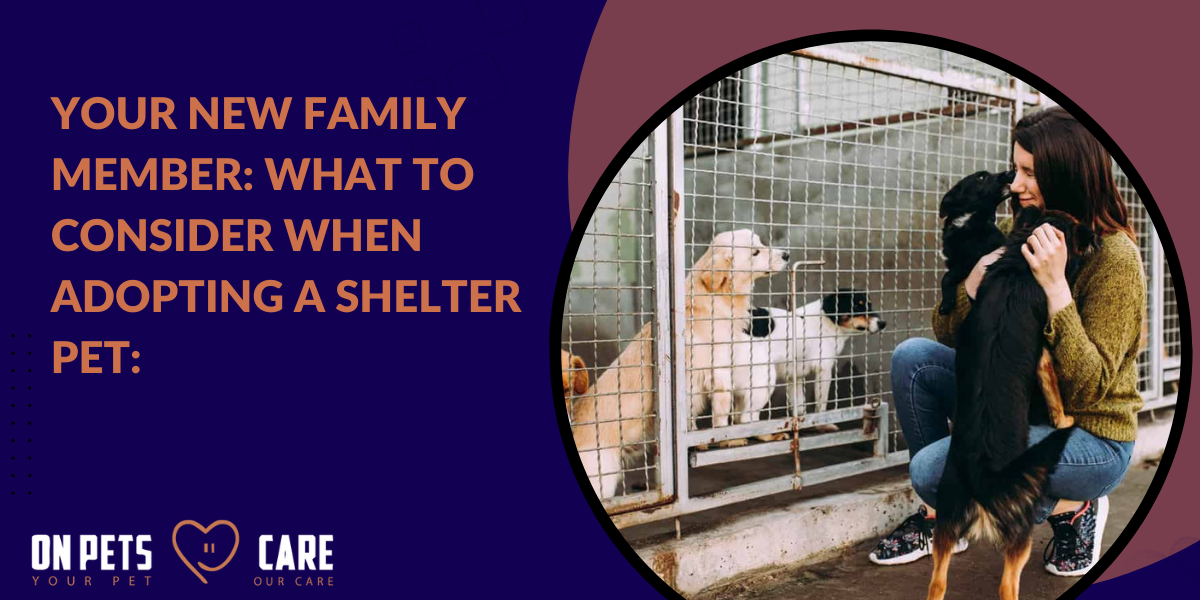Your New Family Member: What to Consider When Adopting a Shelter Pet:
A thrilling and gratifying choice is to add a new pet to your household. There are crucial elements to think about if you’re worried about what to consider when adopting a shelter pet Adopting from a Shelter involves more than just choosing the cutest face; it’s about creating a lifelong bond with a pet that suits your lifestyle and meets their needs.
In this article, we’ll delve into What to Consider When Adopting a Shelter Pet, explore why pets are so expensive and sometimes come with a hefty price tag, and touch on the significance of Onpets Care.
Tips on what to consider when adopting a shelter pet
Assessing Your Lifestyle and Commitment
Matching Lifestyles Adopting a pet is a long-term commitment, often spanning a decade or more. Before making that commitment, take an honest look at your lifestyle. Are you an active outdoor enthusiast or more of a homebody? Different pets have different activity levels, and you’ll want to ensure your new furry friend fits well with your routines.
Time and Attention Pets thrive on companionship and attention. Take into account the time you can commit to your pet’s demands. For instance, dogs need regular mental and physical stimulation. Cats, while more independent, still need social interaction and playtime.
Choosing the Right Type of Pet
Dog, Cat, or Other? The choice between a dog, a cat, or another type of pet should align with your preferences and lifestyle. Dogs generally need more hands-on care, training, and exercise, while cats are often more self-sufficient.
Age Considerations
Puppies and kittens are undeniably adorable, but they also require intensive training and care. Consider adopting an adult or senior pet they’re often calmer and already trained.
Understanding the Adoption Process
Paperwork and Fees Adoption involves paperwork and fees. These fees often contribute to the pet’s vaccinations, spaying/neutering, and initial healthcare. The cost is usually significantly lower than purchasing from a breeder or pet store.
Home Visit and Compatibility Shelters might require a home visit to ensure your living situation is suitable for the pet. Additionally, compatibility checks between you and the pet may be conducted to ensure a harmonious relationship.
Potential Behavioral Challenges
Trauma and Patience Shelter pets might come from various backgrounds, some of which might involve neglect or abuse. Understand that they might require extra patience and time to adjust to their new environment.
Training and Consistency
Consistent training can help address behavioural issues. Spend some time teaching your new buddy using positive reinforcement techniques to foster trust and cooperation.
Money-related Matters
Financial Considerations
Initial Costs While adoption fees are reasonable, initial costs for pet essentials like food, bedding, toys, and grooming tools can add up. Make sure you’re financially prepared for these initial expenses.
Ongoing Expenses Pets come with ongoing expenses like food, regular veterinary check-ups, and potential medical emergencies. Budgeting for these costs is crucial to provide your pet with the best care.
Why Pets Are So Expensive
Veterinary Care and Health Pets require routine veterinary care to stay healthy. Vaccinations, preventive medications, and occasional health issues contribute to the overall cost.
Spaying/Neutering
Shelters usually include spaying or neutering in the adoption fee. This procedure not only prevents unwanted litter but also promotes your pet’s health and reduces certain behavioral problems.
Onpets Care: Ensuring a Happy Home
Ensure a Happy Home with Onpets Care
Exercise and Nutrition for your pet’s health, a balanced diet, and frequent exercise are crucial. To determine the proper nutrition and activity schedule, speak with your veterinarian.
Mental Stimulation
Pets thrive on mental stimulation. Interactive toys, puzzles, and playtime can keep them engaged and prevent boredom.
Conclusion:
Welcoming a shelter pet into your family is a decision filled with love and responsibility. By thoughtfully assessing your lifestyle, understanding What to Consider When Adopting a Shelter Pet, and embracing the financial commitments, you’re taking essential steps toward creating a harmonious life with your new furry friend. Remember, each pet has a unique personality and story, and with patience and care, you’re embarking on a journey that will be rewarding for both you and your new companion
Frequently Asked Questions (FAQs)
FAQ 1: Are shelter pets well-behaved?
Shelter pets come from various backgrounds, so behavior can vary. However, with patience, training, and love, most pets can adapt and become well-behaved companions.
FAQ 2: Can I adopt a specific breed from a shelter?
Yes, breed-specific rescues exist, but shelters usually have mixed-breed pets. Remember, it’s the personality and compatibility that matter most.
FAQ 3: Why do pets from shelters cost less than those from breeders?
Pets from shelters generally have lower adoption fees because shelters aim to find loving homes for animals in need. These fees often cover basic veterinary care and vaccinations, making adoption a cost-effective option compared to purchasing from breeders who might charge more due to specific breeding and genetic traits.
FAQ 4: How can I help my shelter pet adjust to their new home?
Adjustment takes time. Create a calm and safe space, establish routines, and provide positive reinforcement. Introduce your pet to new situations and people gradually to help them gain confidence.
FAQ 5: Are shelter pets healthy?
Shelters prioritize the health of their animals, providing necessary vaccinations and medical care. However, like all pets, they can still experience health issues. A healthy lifestyle and routine vet visits help reduce these worries. In



